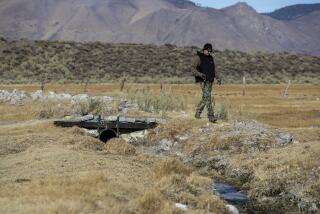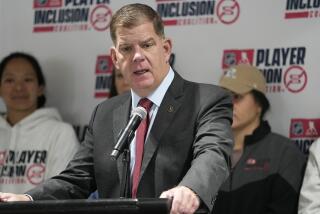SAVING THE NHL SEASON : A Done Deal Almost Came Undone : Hockey: Bettman and Goodenow went down to the wire to get an agreement.
NEW YORK — Monday morning, when Gary Bettman walked into a Manhattan hotel to meet with Bob Goodenow, everyone knew the only logical conclusion was a collective bargaining agreement that would rescue the NHL season.
Forty-eight hours later, however, no one really knew if logic would prevail. No one really knew that the end result would be the contract that union leadership finally accepted early Wednesday afternoon.
There was so much emotion.
Bettman, the commissioner hired by the owners to save them from themselves, was criticized during a high-volume conference call.
There were so many principles.
Goodenow, the staunch NHL Players Assn. executive director who had led the union to a major victory in the 1992 pre-playoff strike, couldn’t afford to give back everything he had won.
There was so much at stake.
Coming off last spring’s thrilling Stanley Cup championship series and toting a new network TV contract, hockey appeared poised to challenge pro basketball for national interest.
Yet after more than 20 hours of face-to-face negotiations, after multiple conference calls between the principals and their constituents, after so much waiting, no one really knew that the players would say yes.
“I think that was the only option they had,” Edmonton General Manager Glen Sather said. “But still . . . “
And that’s why those 48 hours were filled with anxiety.
The Bettman-Goodenow meeting that began Monday morning stretched into Monday afternoon. And Monday evening. After a 90-minute dinner break, negotiations resumed into Monday night. And Tuesday morning.
Reporters, gathered at a hotel across town, couldn’t believe the meeting was still going on. But the owners’ noon Tuesday deadline came and went and the negotiators were still talking.
Tuesday mid-afternoon, Goodenow and Bettman shook hands on what they felt was a solid proposal.
But when Bettman presented it to the owners in a conference call, all hell broke loose.
According to one owner, Bettman was taken to task for caving in on too many union demands. Another said the yelling got so loud, he had to hold the receiver several inches from his ear.
The owners sent Bettman back to Goodenow with specific instructions: Here’s what we’ll give the players.
Take it or leave it. The season, they said, was in the players’ hands.
Most thought the players would take it--despite the restrictive free agency clause, despite the softening of arbitration, despite the presence of a rookie salary cap that could only act as a wage-buster during a player’s entire career.
But who knew? The players were willing to strike in 1992. They were willing to sit out the first half of this season. Hey, those guys are willing to take a stick to the face to score a goal!
Tuesday night, Goodenow went back to his executive committee and consulted with player representatives. They decided to sleep on it.
Wednesday morning, they reviewed it separately and together.
They had to accept it, didn’t they? They couldn’t afford the alternative.
And yet, no one knew.
“Those last few hours, they were killing me,” said one general manager, who asked not to be named.
The entire 48-hour process was hard on everyone.
Members of the NHLPA executive committee sat by the speaker phone in their Toronto office, waiting for Goodenow’s updates. Player representatives for the 26 teams sat by their telephones. Players--from superstars like Wayne Gretzky to lesser-knowns like Mick Vukota--waited to hear from their player reps.
“It’s been an education,” said Vukota, a New York Islander. “The next time I go buy a car, I’ll know their final offer isn’t their final offer.”
Management wasn’t spared anxiety, either.
Members of the negotiation team stayed in contact with Bettman. Owners called friends on the negotiating team. General managers, a nervous lot to begin with, fidgeted and paced as they waited for owners to call. Coaches, paid to stand behind the bench and take charge, felt helpless.
“Finally, sanity has returned,” Philadelphia Flyer GM Bob Clarke said Wednesday afternoon. “I am relieved we are going to be playing hockey again.”
Interested parties with less at stake also had to deal with the negotiating process.
Agents, who had almost as much at stake financially as did players and owners, fretted.
Reporters mulled around their hotel. They speculated. They interviewed each other. They drank cases of Diet Coke and pots of coffee. When talks carried into Tuesday’s wee hours, a few grabbed naps on hallway sofas.
And fans, the real victims of the 103-day lockout, reacted with emotion that ebbed and flowed as their daily papers, local broadcast outlets, ESPN and CNN provided updates.
One minute, a deal was imminent. The next, the season was off.
Finally, union leaders said yes.
Though the 700-some players from around the league still must vote on the contract, it’s expected to pass.
Soon enough, the talk will turn from paychecks to backchecks, from bucks to pucks.
“I wish it hadn’t taken so long,” said Ken Moss, a cafeteria manager in Winnipeg. “But I can’t wait for Saturday nights.”
* RELATED STORY: An uneasy peace settles over the NHL, as a settlement is reached in the 103-day labor dispute. A1
* OTHER STORIES: C6-7
More to Read
Go beyond the scoreboard
Get the latest on L.A.'s teams in the daily Sports Report newsletter.
You may occasionally receive promotional content from the Los Angeles Times.






